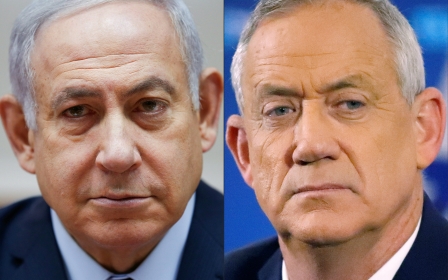Iranian press review: Sanction me too, joke Iranians in face of new US measures

US President Donald Trump’s latest round of sanctions on Iran, following attacks on Saudi Arabia's oil facilities earlier this month, have targeted the already-boycotted Iranian central bank - triggering questions among Iranians regarding the effectiveness of the move.
Iranian authorities downplayed the impact of the new sanctions saying that 20 years ago the US blacklisted the county’s central bank for the first time, and that the Trump administration also boycotted the bank after Washington withdrew from the 2015 nuclear deal last year.
“New sanctions on Iran’s central bank show how desperate Americans are,” Central Bank of Iran Governor Abdolnaser Hemmati said, according to news agency IRNA, adding, “Americans have already imposed on us whatever sanctions that they can, and are now sanctioning entities they've already targeted.”
Trump’s new sanctions has also caused mockery among Iranians on social media.
One Iranian Twitter user offered: “Trump has sanctioned Iran’s central bank so many times that the bank will still stay blacklisted forever, no matter how hard the next US presidents try to lift the sanctions.”
Stay informed with MEE's newsletters
Sign up to get the latest alerts, insights and analysis, starting with Turkey Unpacked
Another Twitter user suggested that Iranians create a #Sanction_Me_Too hashtag, to show the world how indiscriminately and blindly American sanctions target Iranians.
Leadership threaten to 'bury' Israel if war breaks out
Iranian army commanders and influential hardline politicians have renewed threats of attacking Israel if foreign armies target Iran.
Since Saudi Arabia and the US blamed Iran for attacks on Saudi oil facilities earlier this month, Tehran has adopted hostile rhetoric towards Riyadh and its western allies.
“Iran is [the pillar of] the axis of resistance in the region, and if you assault us, Israel will be buried in half a day,” semi-official Tasnim news agency quoted hardline Ayatollah Ahmad Alam al-Hoda as saying during last Friday's prayer sermon.
He went on: “Do you know at all where Iran is? South of Lebanon and Hezbollah are also parts of Iran. Today, wherever in the region a vigilant Muslim lives and wherever a resistance movement exists, Iran is there.”
Meanwhile, the country’s army chief has warned that Iran would not allow Israel to take part in a US-led military coalition in the Gulf, but he did not explain how Iran will carry out this threat.
“It’s so unlikely that they [Israelis] would dare to come here,” Major General Abdolrahim Mousavi was quoted as saying on Saturday. “They might only try to have a symbolic presence. The Persian Gulf is our home and we do not let a regime such as the Zionist regime be active here.”
No mosques for Sunnis in Tehran
A Sunni legislator has told ILNA news agency that over one million Sunni residents of Tehran have no mosques to host the five daily prayers, forcing them to use private homes to host Friday prayers.
While over 95 percent of Iran's population follow the Shia branch of Islam, the republic's Sunni minorities live mainly in the underprivileged provinces of Kurdistan and Balochistan, where they face systematic discrimination.
Iranian Sunni lawmaker Alim Yarmohammadi told ILNA news agency that no areas had been officially allocated for Sunni Muslims' Friday prayers.
“We are following up with intelligence and security entities to figure out if we can have one place for one million Sunnis in Tehran to hold their religious ceremonies,” Yarmohammadi said.
In January, Moulavi Abdol Hamid, the religious leader of Sunni Muslims in Iran, criticised the discrimination to which Iranian Sunnis are subject in an interview with the US-funded Radio Farda, and urged authorities to stop depriving Sunnis of their basic rights of worship.
Flood-hit schools still in ruins
Several village schools in western Iran have not been rebuilt since a devastating flood hit the region in March, Hamshahri newspaper reports.
With the academic year in Iran starting on 23 September, the daily travelled to the western province of Lorestan, where at least 15 people died in the flood, and described the dire state of the region's schools.
“Our children are traumatised by losing their friends who had moved to [other] cities after the flood; by seeing that their village is still drowned under layers of mud; and worst of all, by knowing that there is no school for them to attend this year,” a resident of Baba Zeid village told the newspaper.
The flood totally demolished 130 schools in Lorestan, caused severe damage to 310 other schools and destroyed school equipment in another 179, officials told Hamshahri.
According to the province's director at the education ministry, over 177 billion Iranian rials (about $1.5m) have been invested in rebuilding and renovating the devastated schools of Lorestan, but many were not ready in time for the new academic year.
*Iranian press review is a digest of reports that are not independently verified as accurate by Middle East Eye.
Middle East Eye delivers independent and unrivalled coverage and analysis of the Middle East, North Africa and beyond. To learn more about republishing this content and the associated fees, please fill out this form. More about MEE can be found here.




